
The National Interest Foundation Newsletter
Issue 277, March 14, 2025
Welcome to our NIF Newsletter. In this week’s edition, we provide analysis on the unconstitutional arrest of Columbia University graduate student Mahmoud Khalil, delve into a recent Gallup poll which unveils that Americans’ support towards Israel is at a record low, and examine how President Trump’s tariffs and trade war escalations are a dangerous game.
Editor: Bassam Tarbush
Unconstitutional Arrest of Columbia University Graduate Student Mahmoud Khalil

Khalil’s arrest has prompted large demonstrations calling for his release. (Photo from Reuters)
This week, the unconstitutional arrest of Mahmoud Khalil – a recent Columbia University graduate – has sparked widespread outrage and condemnation. Civil liberty groups, free speech organizations, and rights advocates have outlined how it is a blatant violation of the First Amendment and one of the latest escalations in the Trump administration’s efforts to suppress any legitimate criticism of Israeli policies. During the anti-war Gaza solidarity demonstrations at Columbia University last year, Khalil served as the lead negotiator between student protesters and school administrators as the movement sought to initiate divestment from entities with ties to Israel’s heavily denounced military operations in Gaza and other fair measures. As legal experts have highlighted, Khalil is clearly being wrongfully targeted purely for his activism, as he has not been charged with a crime or violated the terms of his permanent residency in any way. Instead, the unjust arrest of Khalil is an assault on freedom of speech, and should be countered for the threat that it poses to American society and the democratic values that we espouse to uphold and protect.
It is irrefutable that Khalil’s arrest is a flagrant violation of the First Amendment, and thus unconstitutional and illegal. There is no merit behind the detainment, and it implies that anyone can be subject to arrest merely for exercising their right to free speech. The fact that Khalil, a lawful permanent resident of the United States, faces potential deportation without due process or any criminal conviction is abhorrent. Some observers have also rightly alluded to how this is the type of action and repression that one would expect to see in a dictatorship, not a democracy, and that arresting and threatening to deport individuals because of their participation in political activism is something that one would ordinarily associate with the world’s most oppressive authoritarian regimes. The Trump administration’s desire to revoke student visas of foreign students and nationals is already highly problematic, but the idea of Khalil himself potentially being deported is especially shocking and even more troubling given that he is not a foreign national on a student visa, and instead is a permanent resident. As such, Khalil is entitled to the fundamental right of freedom of speech, as protected by the First Amendment. The Supreme Court of the United States (SCOTUS) has recognized that lawful permanent residents, like Khalil, possess First Amendment rights to free speech.
Several civil rights groups and concerned parties have come forward to condemn the arrest and warn about what an action like this unprevented may mean for the country as a whole. The Foundation for Individual Rights and Expression emphasized that anyone facing arrest and detention must be afforded due process, and that our government must abide by the First Amendment. The prospect of the government revoking Khalil’s green card in retaliation for nothing more than free speech is prohibited under the U.S. Constitution. The unlawful arrest also raises serious concerns about the Trump administration’s misuse of immigration enforcement personnel to curtail and punish constitutionally-protected First Amendment freedoms. Their policies are aimed at stoking fear and signaling that dissent will result in negative consequences such as detainment, surveillance, and even possible deportation. Lawyers cautioned that all Americans should be outraged and terrified at the idea of the country incarcerating its residents for simply exercising free speech, and rights advocates called the arrest a targeted attack on First Amendment rights and an unlawful detention which reeks of McCarthyism. In fact, the U.S. State Department under Secretary of State Marco Rubio is using a McCarthy-era law to try and revoke visas of foreigners whom it solely deems to be “pro-Hamas.” This resembles the alleged “reasoning” behind Khalil’s arrest, which no valid justification has been given for, as the Trump administration ludicrously claims that Rubio has made a solo determination that Khalil’s presence in the United States “runs contrary to the country’s interests.” The aforementioned McCarthy-era law, the Immigration and Nationality Act of 1952, codified immigration restrictions against those accused of being subversives, communists, or Soviet agents. Ironically enough, this was an antisemitic law that targeted Eastern European Jewish Holocaust survivors in particular, and now it appears as though Rubio seeks to use it arbitrarily at his discretion as an assault on college campus free speech.
With its unconstitutional arrest of Khalil, it is apparent that the Trump administration is deploying the wrongful and dangerous tactic of conflating fair criticism of Israel’s actions with antisemitism. Similarly to Khalil, many of those taking part in the anti-war demonstrations and solidarity movements on college campuses across the country are merely expressing opposition to abusive Israeli policies and behavior. Thus, attempting to label this human rights activism as “antisemitic” or “pro-Hamas” is inaccurate, and clearly used as a guise to try and shield Israel from justifiable criticism. There is an undeniable and important difference that should be made between speaking out against the actions of a country’s government versus being bigoted towards an entire group of people, yet unfortunately, this harmful conflation makes it extremely difficult for human rights and social justice advocates to take part in activism without being unfairly targeted and labeled as “antisemitic.” In media interviews, Khalil had even explicitly expressed that his activism had no place for antisemitism. The anti-war movements which swept across college campuses all over the United States involved the participation of a highly diverse group of students from various ethnic, racial, and religious backgrounds, including many Jewish-Americans, and so the attempt to try and smear these as “antisemitic” is absurd.
In the aftermath of Khalil’s arrest and ongoing detainment in Louisiana, protesters have taken to the streets in New York and several other cities to speak out against it and call for his release. A federal judge has issued a ruling preventing his deportation while the court reviews the case. Khalil’s lawyers are challenging the arrest on First Amendment grounds saying that the government is engaging in blatant efforts to target his free speech protections. They are also requesting that he be returned to New York, and are planning on filing briefs related to both the illegality of the detention and the venue dispute over the coming week. A Manhattan federal court held a hearing on Wednesday, as the judge ruled that Khalil would remain detained but extended the order which is currently blocking authorities from deporting him.
Recent Gallup Poll Unveils That Americans’ Support Towards Israel is at a Record Low
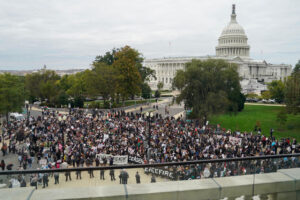
The poll findings suggest that the Gaza War has had an impact on U.S. domestic public opinion towards Israel and Palestine. (Photo from AP)
Less than half of Americans now sympathize more with Israelis than with Palestinians, according to a recent Gallup poll that was released late last week. This is the first time in Gallup’s quarter of a century of annual tracking regarding this measure that the percentage has dipped to below 50%, as only 46% of respondents expressed that their sympathies lie more with Israelis. Prior to this year’s poll results, the previous 51% low point was recorded both last year and back in 2001. Meanwhile, the 33% that indicated their sympathies lie more with Palestinians is the highest that this figure has ever been, and thus, the 13% overall gap this year in 2025 between the “more sympathy with Israelis” and “more sympathy with Palestinians” percentages is the smallest in the 25 years of tracking this phenomenon. The recent trend in the data demonstrates that support for Israelis has continued to drop over the preceding years, while conversely, support for Palestinians has steadily increased. In addition to measuring where Americans’ sympathies lie as it relates to Israelis and Palestinians, the recent poll also gauged American views towards the idea of establishing an independent Palestinian state – something which is still supported by a majority of survey respondents.
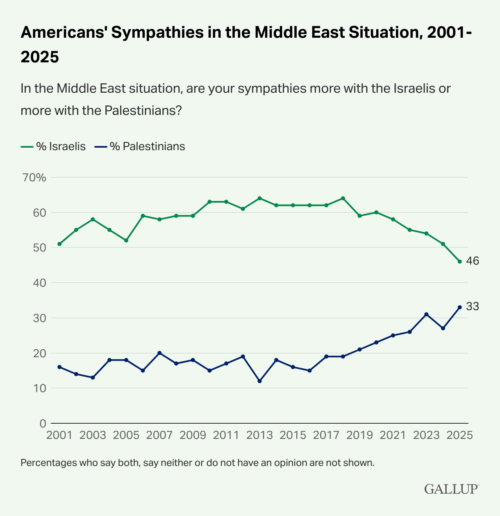
This is the first time that the percentage of those expressing more sympathies with Israelis falls to below 50%. (Photo from Gallup)
The margins between the overall percentage findings in recent years vastly differ from those during the first 15-18 years that the data was collected. While the “more sympathy with Israelis” numbers from 2001 until 2020 ranged between 50% and 65%, over the last five years since then, there has been a consistent and notable decline. On the other hand, the “more sympathy with Palestinians” percentages ranged between 10% and 20% during a similar time frame from 2001 until 2018, when at that point they began increasing and have now reached a record high 33%. The gaps between the annual percentages sat anywhere from 30% to around 50% for a long time, but following 5+ years of steep drops in one figure combined with rises in the other, the margin has significantly dwindled down to its current lowest level of only 13 percentage points this year in 2025.
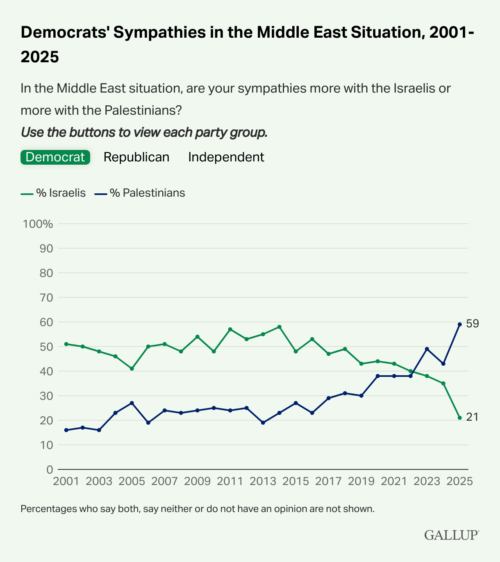
Democrats’ sympathies are now more with Palestinians than Israelis by a ratio of almost 3-to-1. (Photo from Gallup)
The evident shift in sympathies over time is even more pronounced among Americans affiliated with the Democratic Party. The number of Democrats who sympathize more with Palestinians has been growing at a considerable rate since 2013, with the total increase during this period of time standing at a whopping 40 percentage points. This almost identically mirrors the decline that has been seen in the same timespan among those who sympathize more with Israelis. The end result is a near exact reversal in numbers between 2013/2014 and 2025 whereby support for Palestinians over Israelis now sits at a ratio of close to 3-to-1, 59% to 21%. Up until 2022, the percentage of Democrats who sympathized more with Israelis was higher, but since then, the percentage that sympathize more with Palestinians has been. Of particular note are the respective changes in the numbers from last year to this year, which saw a 16% jump in one and a 14% drop in the other.
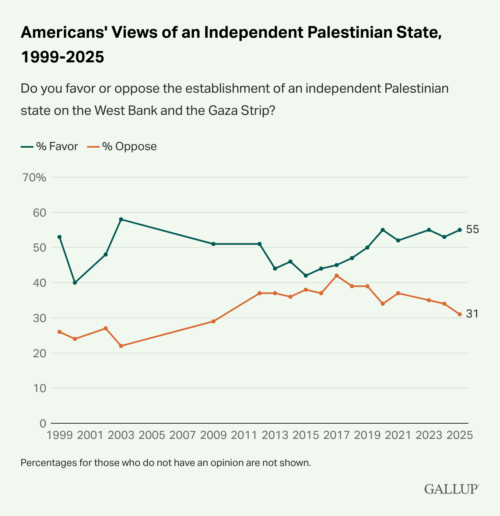
The poll also found that the majority of Americans favor the establishment of an independent Palestinian state. (Photo from Gallup)
The respective percentages of Americans who are in favor or opposed to the idea of establishing an independent Palestinian state have remained steadier in recent years than the fluctuating aforementioned “sympathy” numbers. Since Gallup first began ascertaining views on this back in 1999, more Americans have consistently supported the notion rather than oppose it. In the most recent 2025 poll, 55% were in favor while only 31% opposed. Over the past 26 years, the percentage in favor has always ranged between 40% and 60%, and this figure has never been less in any given year than the percentage who oppose. The number of those in favor has also been an outright majority for the last several years.
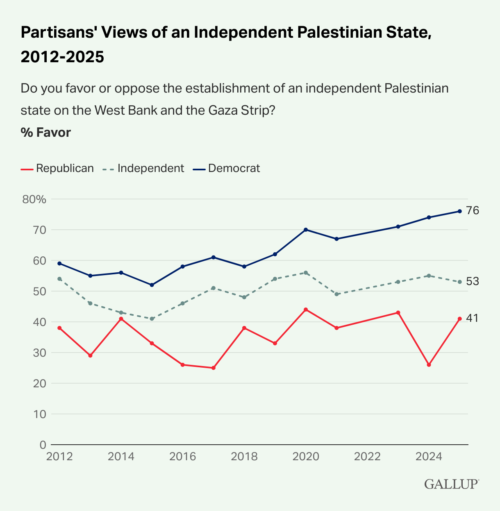
More than three-fourths of Democrats and the majority of Independents favor the establishment of an independent Palestinian state. (Photo from Gallup)
When breaking down the views towards the idea of Palestinian statehood along partisan lines, a majority of both Democrats and Independents are in favor. Over three-fourths of Democrats support this, with the most recent 2025 data showing this figure to be at 76%. With respect to those who identify as Independents, slightly more than half are in favor of this as well at 53%. Only 41% of Republicans support the idea, however, even with this number sitting nearly 10 percentage points below a majority, there has been a noteworthy increase of 15 percentage points from 26% to 41% since last year. It is also worth pointing out that Democrats’ support is at an all-time high, as the number has been climbing substantially for the past 6 years. Despite the Republican percentage being the lowest among the 3 partisan affiliations, the 2025 level of 41% is near the highest that it has been during the 13-year period that the data has been collected. Compared to Democrats and Republicans, the percentages for Independents over the course of this timeframe has been more stable – especially in recent years – as it has remained anywhere between 48% and 56% since 2017.
One of the main driving forces behind the shift in U.S. domestic public opinion that is demonstrated in the recent Gallup poll findings is the impact of the devastating Gaza War. The array of documented evidence regarding egregious Israeli war crimes and human rights violations throughout the conflict in conjunction with the war being so front and center in the news cycle for the past 17 months has certainly played a major role. In fact, Gaza was such a key issue for a significant number of American voters that other polls have shown the consequential effect it had on the drop-off in Democratic support during the 2024 presidential election. Additionally, the deviation of many Americans, particularly among the younger generation, from “legacy media” to non-traditional information sources such as TikTok and Instagram has also had an impact on the public opinion shift. This has meant that more people are now getting their news directly and unfiltered from entities like investigative and independent journalists themselves, rather than relying on “legacy media” outlets that might skew coverage in a specific way. According to a study conducted back in September of last year by Pew Research Center, 45% of young adults from ages 18-29 use TikTok as their primary source for news, while Reddit and Instagram occupy the second and third positions. Another Pew Research Center poll from November of 2024 found that 21% of young adults aged under 30 receive their news via influencers. Most younger Americans (65%) say that they get their information from these sources because they help them understand current events and civic issues, and find them more trustworthy and unfiltered. As a result, views towards Israel and Palestine seem to be changing the most among this demographic of society – largely propelling the overall shift that we see in the recent Gallup poll and others.
Tariffs and Trade War Escalations Are a Dangerous Game

The European Union and Canada both retaliated against Trump’s increased tariffs on aluminum and steel imports. (Photo from Getty Images)
President Trump’s ever-changing back-and-forth erratic tariffs and trade war escalations have prompted reasonable concerns about their negative impact on market stability from private sector leaders and economists. News of the latest tit-for-tat measures this week has seen U.S. businesses report drops in confidence due to all of the uncertainty regarding which tariffs will actually stick from Trump’s continual on-again, off-again announcements. Thus, some are expressing that they have already begun to witness a change in consumer behavior as a result of the volatility, and this has elicited fears about a pullback in spending that could weaken the economy. A scenario that is especially worrisome is one in which growth stagnates but inflation remains high because of tariffs. In addition to hurting the American economy, experts warn that the tariffs and trade war escalations will increase the cost of living many Americans are already struggling with and will also make U.S. businesses less competitive. All of this unease has led to increasing alarm over Trump’s “stop-and-start trade policy” and the further adverse ramifications this will have, both economically and otherwise.
The tariffs and trade war escalations not only have a detrimental effect on the domestic and global market, they are also a dangerous game when it comes to diplomacy and foreign relations. An unstable and prolonged trade war – particularly one that also involves some of the United States’ closest trading partners and allies – is certain to heighten tensions and induce retaliation from other countries, as has already been the case. Just this week, the European Union (EU) responded to Trump’s steel and aluminum tariffs with measures of its own. The EU had previously increased tariffs on a variety of goods in retaliation to Trump actions during his first term, but these were later suspended under the Biden administration. However, now, the EU will allow that suspension to lapse, which will increase tariffs on products such as bourbon, boats, and motorcycles. The bloc is also planning to place tariffs on around 18 billion euros worth of other items, the list of which will be announced later. EU officials have signaled that they preferred not to escalate things, but were pushed to adopt a more aggressive approach due to the Trump administration’s reluctance to negotiate. As many economic analysts have done, EU policymakers have warned that a tit-for-tat tariff fight would negatively impact all parties involved, especially because of the massive scope of the U.S.-EU trading partnership, but it appears as though they felt compelled to retaliate as a result of Trump’s insistence on sidelining diplomacy and imposing tariffs.
There are no real winners in a Trump-initiated trade war, according to the S&P Global. The EU and others like Canada and Mexico might feel the effects of these escalations more severely than the United States. However, one of the major harmful effects this could lead to for the United States specifically is that it may prompt these countries to go to other global markets in order to get the same products for cheaper. The erratic trade war policies have a direct impact on consumers, since they will pay in the form of higher prices. Knowing this, producers and traders will undoubtedly try and seek out cheaper alternatives in other areas of the world. What this might mean is the propping up of once tertiary or secondary market players in developing regions across the globe. Politically and diplomatically as well, the back-and-forth tariffs and threats are sure to intensify tensions between the United States and its allies. For example, Trump announced that in response to the EU’s retaliation, he will seek to add tariffs to European alcohol in a dangerous snowballing of the situation which can easily spiral and get further out of hand. When it comes to our North American neighbors in particular, this could mean less critical support from them during wildfires and other natural disasters.
The Trump administration continues to dismiss legitimate concerns regarding the tariffs and trade war escalations, despite the host of unfavorable consequences and the president’s own admission that these will have negative ramifications. Not only will they have harmful impacts economically and diplomatically, but the mere uncertainty that the tariff announcements and reversals themselves create is enough to caution against that type of erratic policy in the first place.
